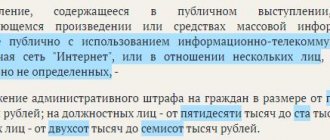Insulting the authorities in accordance with the legislation of the Russian Federation is regarded as a crime. Illegal actions can be directed at an official, head of state, or state symbols. For such a violation, Article 319 of the Criminal Code of the Russian Federation provides for punishment in the form of a fine or correctional labor. In addition, the person who committed the illegal act cannot leave the country.
Article for insulting the authorities with the latest editions for 2020
Actions that are interpreted as an insult to a government official are regulated by Article 319 of the Criminal Code of the Russian Federation, which specifies the amount and terms of punishment. However, until recently, this article and topic were a controversial topic, since on the one hand, Russian citizens cannot be deprived of the opportunity to criticize the actions of the authorities, but the authorities must also be legally protected from attacks on authority.
Important! The head of state is regarded as his symbol, so insulting the president is undoubtedly different from insulting a private individual and is equivalent to desecration of state symbols.
In practice, until the beginning of 2021, Article 319 of the Criminal Code of the Russian Federation on insulting authority was practically not used in practice. Officials fought back based on an article on libel or an article on protection of honor and dignity. The situation changed in March 2019, when the Russian President signed a law allowing to block Internet resources if they contain materials that directly insult government officials, the president, or state symbols.
Important! Corresponding changes were also made to the Code of Administrative Offences. In accordance with the new edition, the fine ranged from 30 to 100 thousand rubles, for a repeated violation - up to 200 thousand rubles and up to 1.5 million rubles if the information led to the death of a person or to unrest.
According to the authors of the legislative initiative, the package of laws contributes to the dissemination of false information, as well as information that offends public morality, the state, and official state signs and symbols.
Types and amount of punishment
According to Art. 319 of the Criminal Code of the Russian Federation provides for 3 types of punishment:
- Fine – up to 40 thousand rubles or in the amount of the convicted person’s income for a period of up to 3 months.
- Correctional labor – up to 1 year.
- Mandatory work – up to 360 hours.
Only one type of punishment can be imposed. If the court considers it possible to order correction, it has the right to limit itself to a suspended sentence. In other cases, you will actually have to pay a fine or work for free for the benefit of society. Real punishment in the form of correctional labor implies work at one’s place of employment or forced labor, which in any case entails the deduction of a certain percentage from the salary to the state income.
If the accused is brought to criminal responsibility for the first time and has made amends for the harm caused, it is possible to impose a court fine instead of that provided for in Art. 319 of the Criminal Code of the Russian Federation. Such a fine cannot be more than half the sanction, that is, the maximum will be 20 thousand rubles. This allows you to dismiss the case in court and avoid a criminal record. Such a practice exists, but it is, however, rare. To terminate the case, it is very important that such a decision is supported by the injured party. You can make amends with a simple apology, either personally or publicly.
Comments on the article
Lawyers draw the attention of Russian citizens to the following innovations:
- on the Internet it is prohibited to disseminate information in an indecent form that bears clear signs of aggression and humiliation of society, the state and government officials;
- the offense is interpreted as petty hooliganism;
- administrative liability applies to individuals over 16 years of age;
- The decision to block Internet resources is made by the Prosecutor General's Office.
Important! You can criticize the authorities, but without indecent expressions and outright aggression. The amendments primarily concern Russian citizens who lead an active life on social networks, run telegram channels, and write news reviews.
It is necessary to understand that a fine is imposed only in relation to materials that meet three requirements:
- the message is presented in an indecent form;
- the form of presentation of information offends the morality of a particular person or society;
- disrespect for the state, its symbols, and government officials is manifested.
No one deprived people of the right to express their point of view about the work of the State Duma, the president of the country, criticize high taxes and low wages, speak out about social injustice, the organization of the education system and medicine. If the information is presented in a cultural manner, there is no talk of any fine or blocking of an Internet resource.
Important! If it is proven that the information contains false data, in this case the author may be charged under another article - libel.
In this law, article of the Criminal Code of the Russian Federation, there is no definition for an indecent form of presenting information. The decision on which message is considered indecent is made by the court and a special examination. However, other laws have articles on punishment for providing information in an indecent manner. It is enough to analyze judicial practice and it becomes clear what is considered unacceptable for publication on the Internet. By the way, swearing is not always regarded as an insult. It is important to prove that the message was written with a specific purpose - to humiliate dignity, to insult. If swearing is used simply to express one’s thoughts, but without malicious intent, another article applies - on the prohibition of using swearing in public places.
Important! Quite often, the authors of offensive posts refer to the fact that they used quite literary words in the message, for example, fool, kike, pig. However, the court does not take this explanation into account, since in this case the word was used to address a specific person with the aim of humiliating and insulting him.
Internet resources are blocked according to a certain algorithm:
- The Prosecutor General or his deputies contact Roskomnadzor. Only these officials have the right to take such an initiative;
- Roskomnadzor demands the provider to block the resource;
- the provider demands that the site owner delete the information, the author has exactly 24 hours from the date of the request to do this;
- If after the allotted time the information is not deleted, access to the resource is limited and resumed only after the post or information is deleted.
Important! A court decision is not needed for such blocking of Internet resources.
Signs of abuse
Insult in this case is classified as a negative assessment of a person, which entails humiliation of the honor and dignity of the individual and undermines the respect for the victim of both other persons and his respect for himself.
It is also expressed in behavior that deviates from generally accepted moral norms. A crime can be expressed verbally, in writing or by action.
An important aspect is the presence of at least one outsider who does not belong to the same authority as the victim. Only under this condition can an insult be considered public.
A crime is considered committed at the moment it is inflicted on the victim, or at the moment when the victim learns about the insult from third parties.
At the same time, it is necessary to distinguish the elements of the crime under the articles “Insulting a representative of authority” and “Hooliganism”.
In the second case, the harm is caused to society as a whole; there may be no specific victim. Article 319 covers only actions committed against a specific government representative.
Tips on where to turn if the site turns out to be fraudulent.
And here are the features of bankruptcy of a municipal unitary enterprise.
Insulting the President
Since the entry into force of the new law, as well as amendments to the Code of Administrative Offences, more than 50 cases have already been opened, more than half of which relate to insulting the president of the country. In each case regarding disrespect for the head of state, a guilty decision was made to pay a fine.
Important! In the summer of 2021, the Ministry of Internal Affairs sent methodological recommendations to police officers, which stated that protocols are drawn up only if the public statement contained obscenities, indecent images of a pornographic nature, or unacceptable comparative images were used. The list of objects of ridicule includes the head of the country, state symbols, the State Duma, the Federation Council, the courts, and the government.
How to prove guilt of insult?
Turning yourself in in such a situation is, with a high degree of probability, simply impossible . At the same time, such offenses are rarely carried out by accident, when the guilty person insulted the president, without assuming the illegality and criminal liability of his actions.
If everyone who insults the president on the Internet were brought to justice, half of the users of the global network would have received criminal records long ago.
Cases are initiated only against those citizens who pose a particular risk to the stability of the country and the political system.
Screenshots of posts on social networks, videos or audio recordings with disrespectful statements are most often used as evidence. When such irrefutable evidence is in hand, there will no longer be an opportunity to avoid responsibility.
In 2021, there were no precedents for criminal cases of insulting the president of the country . This crime is generally very rare, perhaps due to the fact that the president is out of reach for citizens.
According to Art. 319 of the Criminal Code of the Russian Federation, most of the offenses involve police officers as victims in the case, because they are the ones who most often interact with the population.
In Russia there is currently no separate law that would regulate offensive statements addressed to the head of state. These acts are subject to qualification under Art. 319 of the Criminal Code of the Russian Federation.
However, since 2021, negotiations have been underway to adopt a special legislative act that would protect the president from disrespect from citizens. According to experts, it is likely that this law will be adopted in the country in the near future.
Arbitrage practice
In cases of insult to authority, courts make two types of decisions. In the first case, all charges of committing a crime against the accused are dropped due to the reconciliation of the parties. In addition, the ban on leaving the country is cancelled. Here are a few such decisions: No. 1-177/2017, No. 1-705/2017, No. 1-860/2017, No. 1-864/2017.
The second category of decisions is accusatory. The court finds the defendant guilty and orders a fine to be paid to the state. The size is determined by the degree of insult. Also, after the verdict is passed, a preventive measure of not traveling abroad and proper behavior comes into force.
Thus, in the Russian Federation it is possible to criticize the authorities and it is not even prohibited to express your opinion about the work of government bodies. Expressing a negative opinion is a kind of feedback between the people and government officials. However, the law stipulates that even negative assessments must be expressed intelligently, without insults or humiliation. No one abolished from the Constitution the right of citizens to freedom of speech, as well as the dissemination of information. If the criticism is constructive and true facts are presented, no one has the right to impose fines on the author or block the Internet service. Claims arise exclusively to the wording and form of statements.
source:
Objective component of the crime
In order to be held accountable, the guilt of the accused in the criminal act must be proven.
A public insult to a representative of any level of government is a crime committed.
The objective component includes:
- awareness of what is happening and the desire to achieve a certain goal by insults;
- publicity.
You can achieve criminal prosecution based on Art. 319 of the Criminal Code of the Russian Federation, if the showdown expressed in a verbal altercation is not related to personal hostile relationships.
Punishment for insults affecting the honor of a public servant is inevitable only when it occurs in public. Publicity can be expressed:
- the presence of witnesses who are not related to this state government system;
- publication of defamatory materials through the media, including social networks;
- speaking in front of an audience at public events;
- distribution of propaganda leaflets, posters;
- and so on.
The objectivity of a criminal act implies the deliberate desire of the perpetrators to convey to the public defamatory information about a specific person, as a representative of government agencies.
There is no need to confuse the right to reasonably criticize the activities (or inaction) of individual government bodies and their specific representatives.
It is important not to cross the boundaries of what is permitted when expressing personal opinions and value judgments about the professionalism of officials. Insults aimed at undermining the authority of government structures are unacceptable and punishable.
Corpus delicti
The criminality of the act consists in the use, expressed orally or in writing, of indecent or abusive language addressed to a representative of the authorities (official). Even in the case where the perpetrator expressed or expressed in writing truthful information about the victim, but it had the appearance of an insult, such actions reveal the elements of a crime.
The meaning of responsibility for this act is determined by the fact that in addition to insulting a person , which is unacceptable under any circumstances, it is aggravated by being directed at the authority that the person represents.
This discredits not only the individual, which prevents her from properly performing her assigned duties, but also the structure that she represents.
When determining the elements of a crime, there is an important aspect - the insult must be of a public nature, which, in fact, determines the fact of discrediting the power or position held by the victim.
The objective side of insulting a government official consists of social relations in which destructive forms of communication are unacceptable in order to avoid a gap in the protection of the system.
The objective characteristics of the crime include:
- The presence of government representation for the victim, or the status of an official.
- The presence of third parties, which makes it possible to determine the public nature of the crime.
- The specificity of an indecent phrase.
In addition, the objectivity of the act is established through the following factors:
- place and time;
- forms of expression;
- targeting the victim.
Persons who have reached the age of 16 are subject to insulting a government official
The subjective side of the crime contains:
- presence of guilt;
- direct intent;
- motives.
The degree of responsibility of the perpetrator depends on the type of motivation for committing the act. The consequences will be completely different in the following cases:
- When a representative of the authorities or an official provoked indecent expression or attitude towards him.
- When the person guilty of insult responded in this way to an appropriate remark.
- When the culprit interfered with the performance of the duties of an official.
- When the culprit was drunk and having fun.
The crime is over from the moment the offensive acts are committed.






